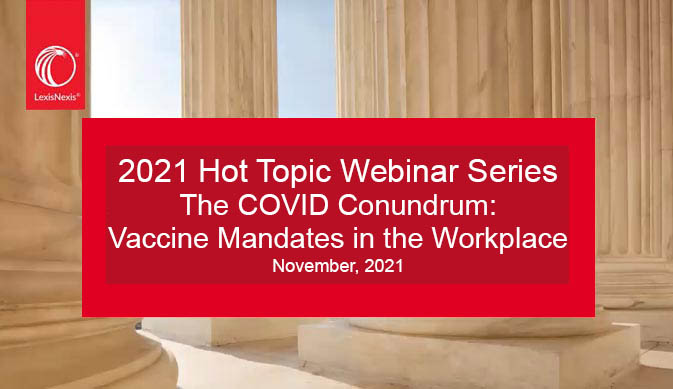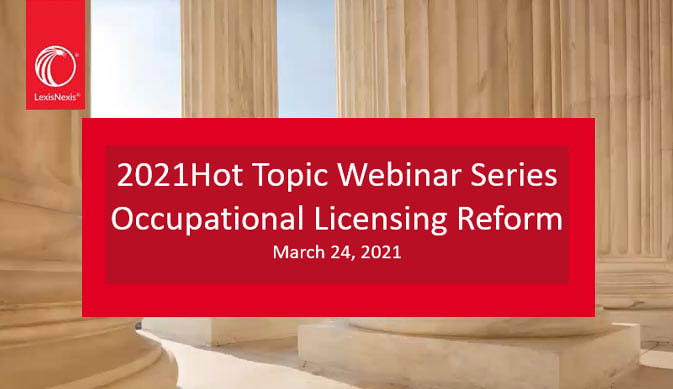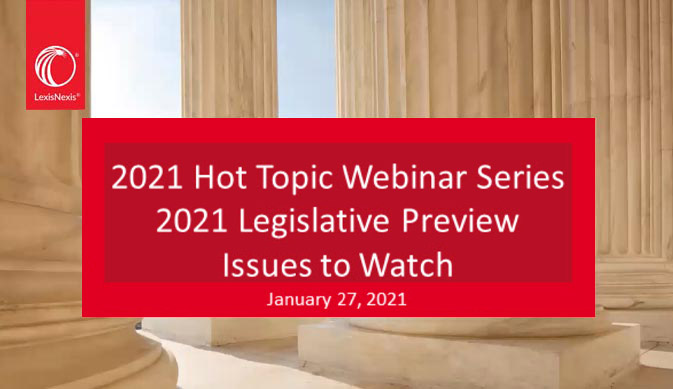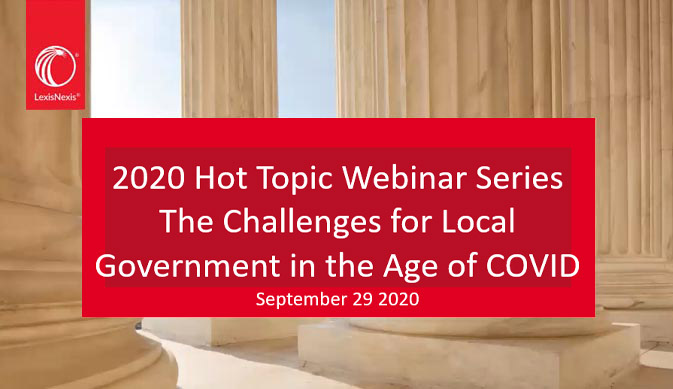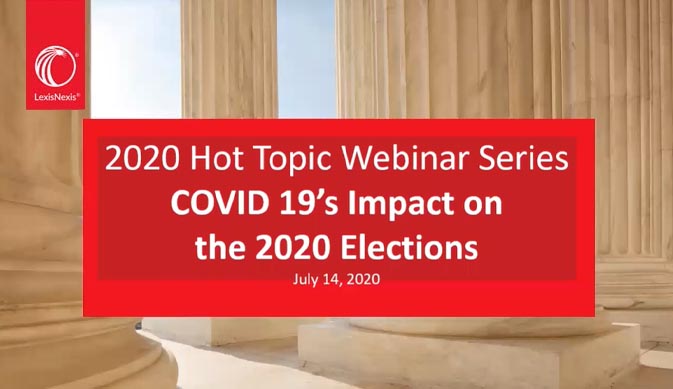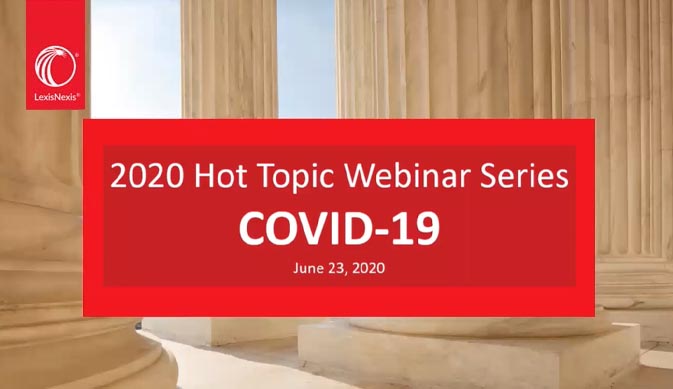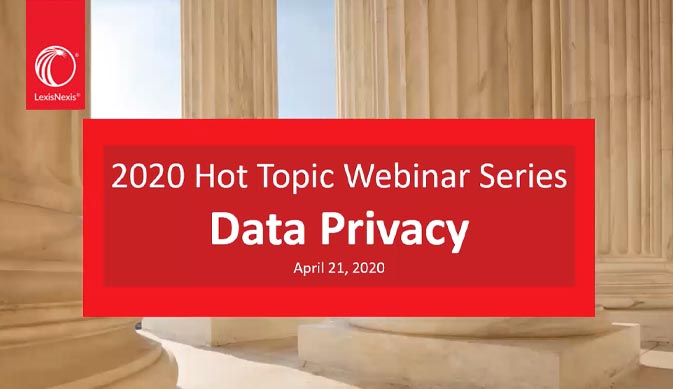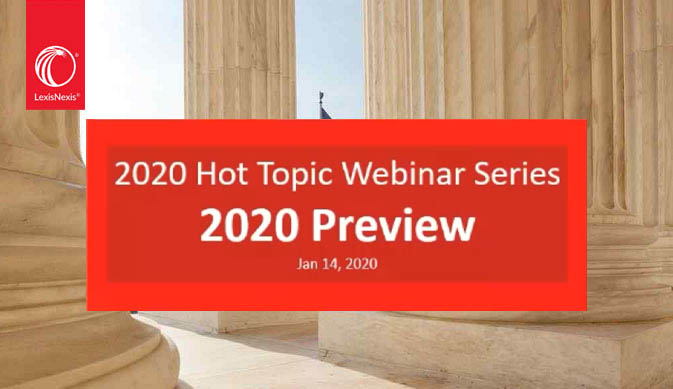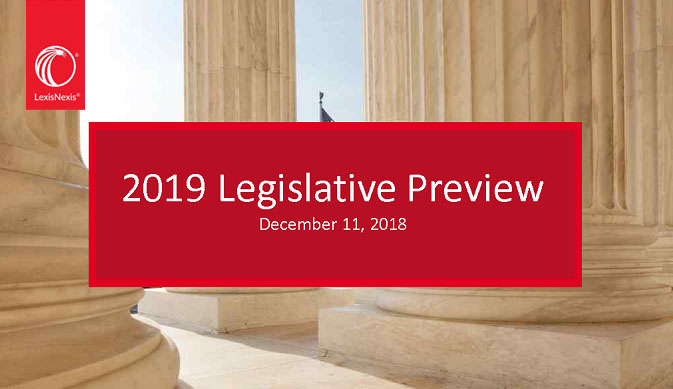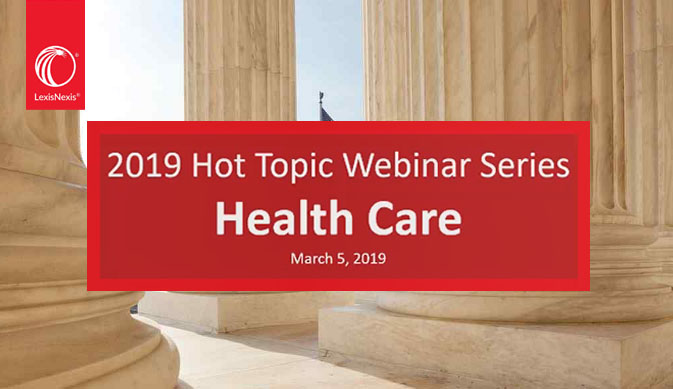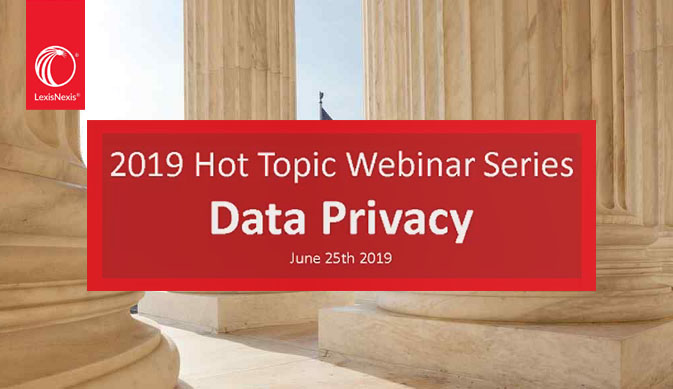State Net Webinars
2021 Webinars
2021 Hot Topic Webinar Series The COVID Conundrum: Vaccine Mandates in the Workplace
Responding to a significant resurgence of the COVID-19 virus, President Biden issued a series of executive orders that impose strict new vaccination and testing mandates on a wide range of the U.S. workforce—including any private company with 100 or more employees. Penalties for noncompliance are steep.
 Patrick Kallerman is vice president of research for the Bay Area Council Economic Institute, where he is responsible for conducting primary analyses, developing research designs and managing projects. His areas of interest include labor economics, health care and the environment. His work has appeared in outlets such as Bloomberg, Fast Company and The Wall Street Journal®.
Patrick Kallerman is vice president of research for the Bay Area Council Economic Institute, where he is responsible for conducting primary analyses, developing research designs and managing projects. His areas of interest include labor economics, health care and the environment. His work has appeared in outlets such as Bloomberg, Fast Company and The Wall Street Journal®.
 Vin Gurrieri has been a New York—based reporter at Law360 for over a decade and is currently an editor-at-large for Law360 Employment Authority’s discrimination and harassment law newsletter. In addition to employment litigation and policy developments, he has also covered intellectual property law and, most recently, state and federal governments’ response to COVID-19.
Vin Gurrieri has been a New York—based reporter at Law360 for over a decade and is currently an editor-at-large for Law360 Employment Authority’s discrimination and harassment law newsletter. In addition to employment litigation and policy developments, he has also covered intellectual property law and, most recently, state and federal governments’ response to COVID-19.
 Sergio Aguilar-Gaxiola, MD, Ph.D Professor, Clinical Internal Medicine, University of California, Davis School of MedicineSergio Aguilar-Gaxiola, MD, PhD is the Founding Director of the Center for Reducing Health Disparities at UC Davis Health and the Director of the Community Engagement Program of the UCD Clinical Translational Science Center.
Sergio Aguilar-Gaxiola, MD, Ph.D Professor, Clinical Internal Medicine, University of California, Davis School of MedicineSergio Aguilar-Gaxiola, MD, PhD is the Founding Director of the Center for Reducing Health Disparities at UC Davis Health and the Director of the Community Engagement Program of the UCD Clinical Translational Science Center.
 Rich Ehisen is Managing Editor of the State Net Capitol Journal™, a LexisNexis publication that covers state public policy issues and trends nationwide. Over the last two decades he has covered everything from Major League Baseball to the U.S. Supreme Court and the California Capitol. He is a frequent public speaker, and his freelance work has appeared in a number of regional and national publications.
Rich Ehisen is Managing Editor of the State Net Capitol Journal™, a LexisNexis publication that covers state public policy issues and trends nationwide. Over the last two decades he has covered everything from Major League Baseball to the U.S. Supreme Court and the California Capitol. He is a frequent public speaker, and his freelance work has appeared in a number of regional and national publications.
2021 Hot Topic Webinar Series Occupational Licensing Reform
According to a recent four-year joint study conducted by the National Conference of State Legislatures, the National Governors Association, and the Council of State Governments, occupational licensing has grown exponentially over the last 60 years, comprising nearly 25 percent of the U.S. workforce, up from 5 percent nearly 60 years ago.
While supporters say proper licensing regulations ensure consumers are able to obtain safe, high-quality professional services, critics contend that this growth has also led to unfair barriers to employment and lower wages for excluded workers.
 Suzanne Hultin is Program Director, Employment, Labor & Retirement Program at the National Conference of State Legislatures (NCSL). In her role, Suzanne oversees issues around employment, occupational licensing and workforce development. She joined NCSL in 2013 as a policy specialist in postsecondary education, with a focus on topics including community colleges, workforce development, and underserved student populations.
Suzanne Hultin is Program Director, Employment, Labor & Retirement Program at the National Conference of State Legislatures (NCSL). In her role, Suzanne oversees issues around employment, occupational licensing and workforce development. She joined NCSL in 2013 as a policy specialist in postsecondary education, with a focus on topics including community colleges, workforce development, and underserved student populations.
 James Tatum is Policy Analyst for National Center for Interstate Compacts, Council of State Governments. James is a policy analyst on the Occupational Licensure Project at the Council of State Governments. He is engaged in the ongoing work to provide evidence-based best practices to members of state governments, occupational licensing stakeholders, and the public. He is a graduate of the University of Florida and holds a master’s in public administration from the University of Kentucky.
James Tatum is Policy Analyst for National Center for Interstate Compacts, Council of State Governments. James is a policy analyst on the Occupational Licensure Project at the Council of State Governments. He is engaged in the ongoing work to provide evidence-based best practices to members of state governments, occupational licensing stakeholders, and the public. He is a graduate of the University of Florida and holds a master’s in public administration from the University of Kentucky.
 Gary Isom is President, CEO, Professional Compliance Services, LLC. In 2018 Gary was appointed by the Arkansas House of Representatives to the state's Occupational Licensing Advisory Group. He was subsequently elected to chair the group, and in 2020 was appointed by Arkansas Governor Asa Hutchinson to the Occupational Licensing Reform Sustainability Group to help prepare legislators for the upcoming general session of the legislature.
Gary Isom is President, CEO, Professional Compliance Services, LLC. In 2018 Gary was appointed by the Arkansas House of Representatives to the state's Occupational Licensing Advisory Group. He was subsequently elected to chair the group, and in 2020 was appointed by Arkansas Governor Asa Hutchinson to the Occupational Licensing Reform Sustainability Group to help prepare legislators for the upcoming general session of the legislature.
 Rich Ehisen is Managing Editor of the State Net Capitol Journal™, a LexisNexis publication that covers state public policy issues and trends nationwide. Over the last two decades he has covered everything from Major League Baseball to the U.S. Supreme Court and the California Capitol. He is a frequent public speaker, and his freelance work has appeared in a number of regional and national publications.
Rich Ehisen is Managing Editor of the State Net Capitol Journal™, a LexisNexis publication that covers state public policy issues and trends nationwide. Over the last two decades he has covered everything from Major League Baseball to the U.S. Supreme Court and the California Capitol. He is a frequent public speaker, and his freelance work has appeared in a number of regional and national publications.
Webinar: 2021 Legislative Preview Issues to Watch
Legislative forecasts for 2020 were completely upended by the coronavirus pandemic, and state lawmakers are likely to be consumed again with COVID-19-related issues impacting all levels of government. This first webinar in our 2021 series dives into the issues state lawmakers will be dealing with this year such as:
- Telehealth
- Vaccine distribution
- Budget repairs
- Economic assistance
- The health of state & local governments
- And more
 Rich Ehisen is managing editor of the State Net Capitol Journal™, a LexisNexis® publication that covers state public policy issues and trends nationwide. His freelance work has also appeared in a number of regional and national publications, including Government Technology, Sunset, San Francisco, Sacramento and Capitol Weekly. He hosts and moderates the Writers Coffeehouse, a monthly networking group of writers, reporters and editors in the Sacramento area.
Rich Ehisen is managing editor of the State Net Capitol Journal™, a LexisNexis® publication that covers state public policy issues and trends nationwide. His freelance work has also appeared in a number of regional and national publications, including Government Technology, Sunset, San Francisco, Sacramento and Capitol Weekly. He hosts and moderates the Writers Coffeehouse, a monthly networking group of writers, reporters and editors in the Sacramento area.
 Maria Koklanaris covers all aspects of state and local taxation. Prior to joining Law360, she spent four and a half years covering state and local taxation for both the print and online versions of State Tax Notes, published by Tax Analysts, and is a longtime contributor to a wide breadth of daily and weekly newspapers, magazines, online publications and newsletters.
Maria Koklanaris covers all aspects of state and local taxation. Prior to joining Law360, she spent four and a half years covering state and local taxation for both the print and online versions of State Tax Notes, published by Tax Analysts, and is a longtime contributor to a wide breadth of daily and weekly newspapers, magazines, online publications and newsletters.
 Lou Cannon was the White House Correspondent for the Washington Post during the Reagan presidency, and has since written five books about the man. Lou is the author of over a dozen books in all, as well as a regular contributor to publications like the Post, the NYT, Real Clear Politics and more.
Lou Cannon was the White House Correspondent for the Washington Post during the Reagan presidency, and has since written five books about the man. Lou is the author of over a dozen books in all, as well as a regular contributor to publications like the Post, the NYT, Real Clear Politics and more.
2020 Webinars
Webinar: The Challenges for Local Government in the Age of COVID
Much of the national discussion about COVID-19 has revolved around the federal and state governments’ responses to the pandemic.
Local governments have seen their share of conflict in relation to the pandemic, too, and are now—more than ever—active in the business space, even in areas typically left to the federal government.
Discover more about the critical business impacts of local ordinance tracking in this webinar brought to you by State Net.
 Rich Ehisen is managing editor of the State Net Capitol Journal™, a LexisNexis® publication that covers state public policy issues and trends nationwide. His freelance work has also appeared in a number of regional and national publications, including Government Technology, Sunset, San Francisco, Sacramento and Capitol Weekly. He hosts and moderates the Writers Coffeehouse, a monthly networking group of writers, reporters and editors in the Sacramento area.
Rich Ehisen is managing editor of the State Net Capitol Journal™, a LexisNexis® publication that covers state public policy issues and trends nationwide. His freelance work has also appeared in a number of regional and national publications, including Government Technology, Sunset, San Francisco, Sacramento and Capitol Weekly. He hosts and moderates the Writers Coffeehouse, a monthly networking group of writers, reporters and editors in the Sacramento area.
 Teryn Zmuda is Deputy Chief Innovation Officer and Chief Economist for the NACo County Innovations Lab, where she oversees quantitative and qualitative research within the Lab, produces economic analysis of countries and leads collaboration in NACo's data-driven initiatives.
Teryn Zmuda is Deputy Chief Innovation Officer and Chief Economist for the NACo County Innovations Lab, where she oversees quantitative and qualitative research within the Lab, produces economic analysis of countries and leads collaboration in NACo's data-driven initiatives.
 Brooks Rainwater is Senior executive and director of the National League of Cities' (NLC) Center for City Solutions, where he drives the organization's research agenda, community engagement efforts and leadership education programming to help city leaders create strong local economies, safe and vibrant neighborhoods, world-class infrastructure and a sustainable environment.
Brooks Rainwater is Senior executive and director of the National League of Cities' (NLC) Center for City Solutions, where he drives the organization's research agenda, community engagement efforts and leadership education programming to help city leaders create strong local economies, safe and vibrant neighborhoods, world-class infrastructure and a sustainable environment.
The Governance and Election Impact of COVID-19
NCSL Executive Director Tim Storey and Rich Ehisen, Managing Editor of State Net Capitol Journal conduct a lively discussion on the potential impacts and implications of COVID-19 on the upcoming election year. Even without the effects of a pandemic on America, 2020 was setting up to be one of the more contentious elections, with both sides seemingly further apart and unwilling to budge than in past years.
- How will COVID-19 impact turnout?
- What will be the resolution of mail-in ballots?
 Tim Storey is the Executive Director of the National Conference of State Legislatures (NCSL). NCSL’s mission is to serve America’s state legislatures and the legislatures of the U.S. territories. Tim has spent the past 30 years working for and studying legislatures, specializing in the areas of elections, redistricting, legislative organization and leadership.
Tim Storey is the Executive Director of the National Conference of State Legislatures (NCSL). NCSL’s mission is to serve America’s state legislatures and the legislatures of the U.S. territories. Tim has spent the past 30 years working for and studying legislatures, specializing in the areas of elections, redistricting, legislative organization and leadership.
 Rich Ehisen is managing editor of the State Net Capitol Journal™, a LexisNexis® publication that covers state public policy issues and trends nationwide. His freelance work has also appeared in a number of regional and national publications, including Government Technology, Sunset, San Francisco, Sacramento and Capitol Weekly. He hosts and moderates the Writers Coffeehouse, a monthly networking group of writers, reporters and editors in the Sacramento area.
Rich Ehisen is managing editor of the State Net Capitol Journal™, a LexisNexis® publication that covers state public policy issues and trends nationwide. His freelance work has also appeared in a number of regional and national publications, including Government Technology, Sunset, San Francisco, Sacramento and Capitol Weekly. He hosts and moderates the Writers Coffeehouse, a monthly networking group of writers, reporters and editors in the Sacramento area.
How COVID-19 Has Impacted State and Local Governance
Prior to the United States being affected by the pandemic, there were a few regulations and policies under consideration in terms of telemedicine, and privacy issues around contact tracing was something not even being considered.
When COVID-19 hit, states and local municipalities had to quickly tackle new agenda items and consider different policies and regulations for others.
How have state and local governments reacted? What policies and procedures have quickly been adopted and what are the implications of these down the road?
Besides tackling telemedicine and contact tracing, our states and local governments are also addressing:
- State taxes and budgets
- Limiting civil liability to businesses and health care providers
- Business interruption coverage
- Changes to workers’ compensation and other workplace issues
 Rich Ehisen is managing editor of the State Net Capitol Journal™, a LexisNexis® publication that covers state public policy issues and trends nationwide. His freelance work has also appeared in a number of regional and national publications, including Government Technology, Sunset, San Francisco, Sacramento and Capitol Weekly. He hosts and moderates the Writers Coffeehouse, a monthly networking group of writers, reporters and editors in the Sacramento area.
Rich Ehisen is managing editor of the State Net Capitol Journal™, a LexisNexis® publication that covers state public policy issues and trends nationwide. His freelance work has also appeared in a number of regional and national publications, including Government Technology, Sunset, San Francisco, Sacramento and Capitol Weekly. He hosts and moderates the Writers Coffeehouse, a monthly networking group of writers, reporters and editors in the Sacramento area.
 Maria Koklanaris covers all aspects of state and local taxation. Prior to joining Law360, she spent four and a half years covering state and local taxation for both the print and online versions of State Tax Notes, published by Tax Analysts, and is a longtime contributor to a wide breadth of daily and weekly newspapers, magazines, online publications and newsletters.
Maria Koklanaris covers all aspects of state and local taxation. Prior to joining Law360, she spent four and a half years covering state and local taxation for both the print and online versions of State Tax Notes, published by Tax Analysts, and is a longtime contributor to a wide breadth of daily and weekly newspapers, magazines, online publications and newsletters.
 Lou Cannon was the White House Correspondent for the Washington Post during the Reagan presidency, and has since written five books about the man. Lou is the author of over a dozen books in all, as well as a regular contributor to publications like the Post, the NYT, Real Clear Politics and more.
Lou Cannon was the White House Correspondent for the Washington Post during the Reagan presidency, and has since written five books about the man. Lou is the author of over a dozen books in all, as well as a regular contributor to publications like the Post, the NYT, Real Clear Politics and more.
State Net Webinar Series: Data Privacy 2020
With the enactment of the California Consumer Privacy Act (CCPA), other state lawmakers are turning their attention from data breaches to data privacy. By California leading the charge, other states have a place to start with their own legislation. Some want to water it down, some want to strengthen it. How is each state defining its own legislation and how does that impact the companies that use this type of data?
States are working their version of CCPA and the impacts on companies touched by data privacy legislation. In particular, issues such as:
- The potential for Congress to implement a singular federal data privacy law
- Compliance challenges companies face with all data privacy measures
- Carrot or stick: Other data privacy concerns and options throughout the states
 Rich Ehisen is managing editor of the State Net Capitol Journal™, a LexisNexis® publication that covers state public policy issues and trends nationwide. His freelance work has also appeared in a number of regional and national publications, including Government Technology, Sunset, San Francisco, Sacramento and Capitol Weekly. He hosts and moderates the Writers Coffeehouse, a monthly networking group of writers, reporters and editors in the Sacramento area.
Rich Ehisen is managing editor of the State Net Capitol Journal™, a LexisNexis® publication that covers state public policy issues and trends nationwide. His freelance work has also appeared in a number of regional and national publications, including Government Technology, Sunset, San Francisco, Sacramento and Capitol Weekly. He hosts and moderates the Writers Coffeehouse, a monthly networking group of writers, reporters and editors in the Sacramento area.
 Mary Stone Ross is the former president of Californians for Consumer Privacy. In that role she coauthored the California Consumer Privacy Act (CCPA), an initiative to safeguard Californians’ privacy. The initiative led to the unanimous passage by the California legislature of AB 375, the CCPA, to date, the most comprehensive consumer privacy law in the United States.
Mary Stone Ross is the former president of Californians for Consumer Privacy. In that role she coauthored the California Consumer Privacy Act (CCPA), an initiative to safeguard Californians’ privacy. The initiative led to the unanimous passage by the California legislature of AB 375, the CCPA, to date, the most comprehensive consumer privacy law in the United States.
 W. Reece Hirsch co-heads the firm’s privacy and cybersecurity practice and counsels clients on a wide range of US privacy issues, specializing in healthcare privacy and digital health. Reece counsels clients on development of privacy policies, procedures and compliance programs, security incident planning and response, and online, mobile app, and Internet of Things privacy.
W. Reece Hirsch co-heads the firm’s privacy and cybersecurity practice and counsels clients on a wide range of US privacy issues, specializing in healthcare privacy and digital health. Reece counsels clients on development of privacy policies, procedures and compliance programs, security incident planning and response, and online, mobile app, and Internet of Things privacy.
2020 Hot Legislative Issues
You have a tough job—protecting your clients or organization by closely monitoring, managing and staying on top of critical legislative and regulatory activities. Let us help. LexisNexis® State Net® would like to invite you to a free webinar where you can hear about the issues state legislators will tackle in 2020, including:
- Consumer Data & Protection—The California Consumer Privacy Act goes into effect on January 1, 2020, and several other states have adopted laws to regulate the management and use of consumer data, with more expected to follow suit in 2020. How will these laws impact your clients or organization?
- Employee vs. Independent Contractor—California’s new worker classification could have a huge impact on the burgeoning gig economy. Will other states follow suite? And which employment sectors are most likely to feel the impact?
- Internal Conflicts—Increasingly, cities and other local governments are adopting measures that clash with state policies, from wage and benefit laws to how elections are carried out. The best way to protect your clients’ interests is to stay on top of it all.
- SCOTUS Watch—The nation’s highest court is expected to hand down historic decisions that could impact everyone, from living rooms to boardrooms. Abortion, immigration and LGBTQ rights are just a few of the issues that loom large on the Court’s docket.
 Natalie Rodriguez is the editor-at-large at Law360® and co-host of the publication’s weekly Supreme Court podcast, The Term. Natalie holds a master’s from Columbia University Graduate School of Journalism, as well as a bachelor’s in Communication & Media Studies (Journalism) from Fordham University.
Natalie Rodriguez is the editor-at-large at Law360® and co-host of the publication’s weekly Supreme Court podcast, The Term. Natalie holds a master’s from Columbia University Graduate School of Journalism, as well as a bachelor’s in Communication & Media Studies (Journalism) from Fordham University.
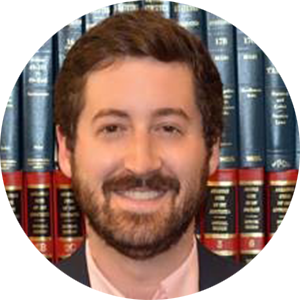 Ben Williams is a policy specialist in the NCSL Elections and Redistricting program. Along with the program director, he manages NCSL’s redistricting portfolio. Before coming to NCSL, Ben worked at Princeton University. He graduated from Tulane University with a double-major in International Relations and History and a minor in Latin American Studies. He has a J.D. from William & Mary Law School, where he was a member of the Election Law program and an editor of the William & Mary Bill of Rights Journal.
Ben Williams is a policy specialist in the NCSL Elections and Redistricting program. Along with the program director, he manages NCSL’s redistricting portfolio. Before coming to NCSL, Ben worked at Princeton University. He graduated from Tulane University with a double-major in International Relations and History and a minor in Latin American Studies. He has a J.D. from William & Mary Law School, where he was a member of the Election Law program and an editor of the William & Mary Bill of Rights Journal.
 Rich Ehisen is managing editor of the State Net Capitol Journal™, a LexisNexis® publication that covers state public policy issues and trends nationwide. His freelance work has also appeared in a number of regional and national publications, including Government Technology, Sunset, San Francisco, Sacramento and Capitol Weekly. He hosts and moderates the Writers Coffeehouse, a monthly networking group of writers, reporters and editors in the Sacramento area.
Rich Ehisen is managing editor of the State Net Capitol Journal™, a LexisNexis® publication that covers state public policy issues and trends nationwide. His freelance work has also appeared in a number of regional and national publications, including Government Technology, Sunset, San Francisco, Sacramento and Capitol Weekly. He hosts and moderates the Writers Coffeehouse, a monthly networking group of writers, reporters and editors in the Sacramento area.
2019 Webinars
2019 Hot Legislative Issues
Is it your job to monitor, manage and stay on top of the legislative and regulatory activities that could impact your clients or organization? If so, please listen in as moderator Rich Ehisen, along with our skilled guest panelists Wendy Underhill and Kevin Schmidt, explore some of the hottest topics statehouses across the nation would grapple with in 2019, including:
- Data privacy and security and cybersecurity—Ransomware, data breaches and other techno-threats are in the news almost daily. Companies who fail to protect digitized information face penalties and reporting requirements. Is Blockchain technology the key to cybersecurity?
- Online Sales Tax—In the post-Wayfair era, how likely is it that more states will tap into the potential massive revenue stream generated by collecting online sales taxes? Can they afford not to?
- Healthcare—In 2019, states will have to tackle many thorny issues related to the availability and costs of medical treatment, including the expansion or reduction in Medicaid; the continued viability of the Affordable Care Act; and prescription drug prices, just to name a few.
 Wendy Underhill is the director for elections and redistricting at the National Conference of State Legislatures, headquartered in Denver. Originally Wendy specialized in research and analysis on elections issues, such as online voter registration and voting technology. Most recently she has focused on providing objective, bipartisan information and analysis on redistricting law and processes. Previously, Wendy worked as a policy analyst for the U.S. Senate and the U.S. Department of the Treasury, and in management for various Colorado nonprofits.
Wendy Underhill is the director for elections and redistricting at the National Conference of State Legislatures, headquartered in Denver. Originally Wendy specialized in research and analysis on elections issues, such as online voter registration and voting technology. Most recently she has focused on providing objective, bipartisan information and analysis on redistricting law and processes. Previously, Wendy worked as a policy analyst for the U.S. Senate and the U.S. Department of the Treasury, and in management for various Colorado nonprofits.
 Kevin Schmidt is the Manager of Customer Service at State Net. He has been with State Net for 27 years and got his start working for the California Journal, a periodical on California Politics that was published by State Net. In the mid 2000s, Kevin transferred to the legislative and regulatory tracking side of the State Net business. In his current role, Kevin manages the State Net national customer service team and has been specializing in supporting the State Net compliance product as well as its legislative and regulatory issue screening product. Most recently Kevin has been a part of the team that is rolling out the new State Net local ordinance monitoring service.
Kevin Schmidt is the Manager of Customer Service at State Net. He has been with State Net for 27 years and got his start working for the California Journal, a periodical on California Politics that was published by State Net. In the mid 2000s, Kevin transferred to the legislative and regulatory tracking side of the State Net business. In his current role, Kevin manages the State Net national customer service team and has been specializing in supporting the State Net compliance product as well as its legislative and regulatory issue screening product. Most recently Kevin has been a part of the team that is rolling out the new State Net local ordinance monitoring service.
 Rich Ehisen is managing editor of the State Net Capitol Journal™, a LexisNexis® publication that covers state public policy issues and trends nationwide. His freelance work has also appeared in a number of regional and national publications, including Government Technology, Sunset, San Francisco, Sacramento and Capitol Weekly. He hosts and moderates the Writers Coffeehouse, a monthly networking group of writers, reporters and editors in the Sacramento area.
Rich Ehisen is managing editor of the State Net Capitol Journal™, a LexisNexis® publication that covers state public policy issues and trends nationwide. His freelance work has also appeared in a number of regional and national publications, including Government Technology, Sunset, San Francisco, Sacramento and Capitol Weekly. He hosts and moderates the Writers Coffeehouse, a monthly networking group of writers, reporters and editors in the Sacramento area.
2019 Healthcare Issues
Read a few headlines or watch a couple of minutes of any news program and you will know in an instant that healthcare is the primary issue on the minds of everyone—families, employers, politicians, CEOs and everyone in between. In 2019, legislatures across the nation met head-on with many tricky healthcare issues, and their actions could impact your clients or organization, such as:
- The ACA: Although the Affordable Care Act faces further legal challenges, most states are moving forward on the presumption it will remain the law of the land. They also are weighing their own methods for bolstering the law within their borders, including imposing state individual mandates on health coverage and mandating that health insurers continue to cover pre-existing conditions.
- Medicaid: To date, 37 states have opted to expand Medicaid in accordance with the parameters set forth by the ACA. But the debate over conditions set forth in some states, including work requirements, continues to roil statehouses. None may be more closely watched than the order by California Gov. Gavin Newsom to combine drug price negotiations for millions of people covered by government-administered plans like Medi-Cal (CA’s version of Medicaid) under one state agency.
- Single-payer proposals: Newsom and Washington Gov. Jay Inslee have also taken steps toward implementing a statewide single-payer health coverage plan. This comes on the heels of some states also weighing so-called “Medicaid/Medicare for all” proposals that allow any legal resident to buy coverage through the state-federal Medicaid plan.
 Rich Ehisen is managing editor of the State Net Capitol Journal™, a LexisNexis® publication that covers state public policy issues and trends nationwide. His freelance work has also appeared in a number of regional and national publications, including Government Technology, Sunset, San Francisco, Sacramento and Capitol Weekly. He hosts and moderates the Writers Coffeehouse, a monthly networking group of writers, reporters and editors in the Sacramento area.
Rich Ehisen is managing editor of the State Net Capitol Journal™, a LexisNexis® publication that covers state public policy issues and trends nationwide. His freelance work has also appeared in a number of regional and national publications, including Government Technology, Sunset, San Francisco, Sacramento and Capitol Weekly. He hosts and moderates the Writers Coffeehouse, a monthly networking group of writers, reporters and editors in the Sacramento area.
 Dr. Micah Weinberg is currently president of the Bay Area Council Economic Institute, the leading think tank focused on the most critical economic and policy issues facing the Silicon Valley/San Francisco region. He is also CEO of Healthy Systems Project, a firm that delivers policy and market intelligence and strategic guidance in the areas of healthcare and economic development. Weinberg has written and lectured extensively about health system transformation with a focus on the insurance market reforms of the Affordable Care Act, and he is an expert on state-based health insurance exchanges.
Dr. Micah Weinberg is currently president of the Bay Area Council Economic Institute, the leading think tank focused on the most critical economic and policy issues facing the Silicon Valley/San Francisco region. He is also CEO of Healthy Systems Project, a firm that delivers policy and market intelligence and strategic guidance in the areas of healthcare and economic development. Weinberg has written and lectured extensively about health system transformation with a focus on the insurance market reforms of the Affordable Care Act, and he is an expert on state-based health insurance exchanges.
 Diana S. Dooley is the secretary of the California Health and Human Services Agency where she serves as a voting, ex officio member of the newly created California Health Benefit Exchange Board. She also serves as a member or ex officio member of numerous other state boards and commissions. Among her many professional accomplishments, Dooley has served as legislative director and special assistant for the state governor’s office and has served as general counsel and vice president at Children’s Hospital Central California where she established an in-house legal services program and directed the hospital’s advocacy, communications and governmental relations programs.
Diana S. Dooley is the secretary of the California Health and Human Services Agency where she serves as a voting, ex officio member of the newly created California Health Benefit Exchange Board. She also serves as a member or ex officio member of numerous other state boards and commissions. Among her many professional accomplishments, Dooley has served as legislative director and special assistant for the state governor’s office and has served as general counsel and vice president at Children’s Hospital Central California where she established an in-house legal services program and directed the hospital’s advocacy, communications and governmental relations programs.
Critical Data Privacy Issues
Sadly, it seems that data breaches and other cyberthreats have become a part of our everyday lives. And these serious and pervasive threats have spurred state lawmakers into action. Every day, new laws governing the collection, storage and use of sensitive data hit the books. Are you up to speed? Download our webinar to listen to an insightful discussion about some of the data privacy issues state legislators tackled in 2019, such as:
- The numerous measures under consideration to alter the CCPA
- How such changes might impact consumers and industries across the nation
- Whether any changes could impact official guidelines under development in the California Attorney General’s office
- The biggest challenges businesses will face in complying with the CCPA
 Rich Ehisen is managing editor of the State Net Capitol Journal™, a LexisNexis® publication that covers state public policy issues and trends nationwide. His freelance work has also appeared in a number of regional and national publications, including Government Technology, Sunset, San Francisco, Sacramento and Capitol Weekly. He hosts and moderates the Writers Coffeehouse, a monthly networking group of writers, reporters and editors in the Sacramento area.
Rich Ehisen is managing editor of the State Net Capitol Journal™, a LexisNexis® publication that covers state public policy issues and trends nationwide. His freelance work has also appeared in a number of regional and national publications, including Government Technology, Sunset, San Francisco, Sacramento and Capitol Weekly. He hosts and moderates the Writers Coffeehouse, a monthly networking group of writers, reporters and editors in the Sacramento area.
 Scott Ferber, a partner in King & Spalding LLP’s Data, Privacy and Security practice, leverages his extensive experience as a former federal prosecutor and in senior leadership at the U.S. Department of Justice (DOJ) to counsel clients on data breach prevention, preparedness, incident response, remediation, compliance, internal investigations, regulatory enforcement and breach-related litigation.
Scott Ferber, a partner in King & Spalding LLP’s Data, Privacy and Security practice, leverages his extensive experience as a former federal prosecutor and in senior leadership at the U.S. Department of Justice (DOJ) to counsel clients on data breach prevention, preparedness, incident response, remediation, compliance, internal investigations, regulatory enforcement and breach-related litigation.
 As a global data privacy/protection and sovereignty expert, Sheila FitzPatrick has worked with the U.S. Government, the Council of the European Union and country-specific data protection agencies in Europe, Asia/Pacific and The Americas. As the liaison between management and the Works Councils, she has written over 150 model contracts and bargaining agreements in over 60 countries, and achieved Binding Corporate Rules (BCRs) approvals for six multinational companies.
As a global data privacy/protection and sovereignty expert, Sheila FitzPatrick has worked with the U.S. Government, the Council of the European Union and country-specific data protection agencies in Europe, Asia/Pacific and The Americas. As the liaison between management and the Works Councils, she has written over 150 model contracts and bargaining agreements in over 60 countries, and achieved Binding Corporate Rules (BCRs) approvals for six multinational companies.
Pros and Cons of the Gig Economy
You may not realize it, but despite the increased buzz in the employment sector and recent reactions from state courts and federal agencies, the “Gig Economy” is not a new phenomenon. In fact, it arose in 2008 – 2009 in the wake of the Great Recession—displaced workers, scrambling to find jobs, found lifelines though contract- or task-based work. Today, the Gig Economy is booming, and now state lawmakers and employers are the ones scrambling. Is your organization ready?
Your colleagues rely on LexisNexis® State Net® to monitor, manage and stay on top of critical legislative and regulatory activities. We’d like to show you why. Listen in to the insightful discussion about some of the serious Gig Economy issues that state legislators are grappling with today and will continue to confront in 2020, such as:
- How California’s AB 5 changes the way workers can be classified as “independent contractors” or “employees” and whether other states follow suit
- New state laws on increased paid time off and greater protections against workplace discrimination
- Clashes between state and federal wage and hour laws, including the FLSA, in the wake of the April 2019 DOL opinion letter on classifying workers as “employees” or “independent contractors”
- State-sponsored retirement plans for “freelance” or contract workers, such as those in Maryland and Oregon
 Diane Mulcahy is an adjunct lecturer in the Entrepreneurship division at Babson College. She created and teaches the MBA class Entrepreneurship and the Gig Economy, which was named by Forbes.com as one of the Top 10 Most Innovative Business School Classes in the country. Diane is also a Senior Fellow at the Ewing Marion Kauffman Foundation, where she manages the Foundation’s portfolio of private equity, venture capital and real assets investments, and writes frequently about the venture capital (VC) industry.
Diane Mulcahy is an adjunct lecturer in the Entrepreneurship division at Babson College. She created and teaches the MBA class Entrepreneurship and the Gig Economy, which was named by Forbes.com as one of the Top 10 Most Innovative Business School Classes in the country. Diane is also a Senior Fellow at the Ewing Marion Kauffman Foundation, where she manages the Foundation’s portfolio of private equity, venture capital and real assets investments, and writes frequently about the venture capital (VC) industry.
 Rich Ehisen is managing editor of the State Net Capitol Journal™, a LexisNexis® publication that covers state public policy issues and trends nationwide. His freelance work has also appeared in a number of regional and national publications, including Government Technology, Sunset, San Francisco, Sacramento and Capitol Weekly. He hosts and moderates the Writers Coffeehouse, a monthly networking group of writers, reporters and editors in the Sacramento area.
Rich Ehisen is managing editor of the State Net Capitol Journal™, a LexisNexis® publication that covers state public policy issues and trends nationwide. His freelance work has also appeared in a number of regional and national publications, including Government Technology, Sunset, San Francisco, Sacramento and Capitol Weekly. He hosts and moderates the Writers Coffeehouse, a monthly networking group of writers, reporters and editors in the Sacramento area.
Let’s get started
Contact us by completing the form below. If you need immediate assistance, please call 800-726-4566.
LexisNexis, a division of RELX Inc., may contact you in your professional capacity with information about our other products, services and events that we believe may be of interest. You can manage your communication preferences via our Preference Center. You can learn more about how we handle your personal data and your rights by reviewing our Privacy Policy.
